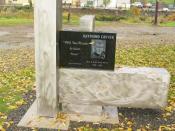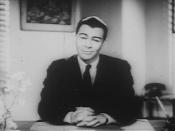Blindness can manifest itself in many ways. Arguably the most detrimental form of this condition may be the figurative blindness of oneÃÂs own situations and ignorance towards the feelings of others. In Raymond Carver's short story "Cathedral," the narrator's emotional and psychological blindness is immediately apparent. The many issues faced by the narrator as well as the turn-around experienced at the culmination of the tale are the main ideas for the theme of this story; and these ideas aid the narrator in eventually succumbing to character transformation by simply regarding the literal blind man in a positive light.
The narratorÃÂs statement at the very beginning of the story explains his own lack of knowledge concerning physical blindness. His lack of knowledge relating to the visitorÃÂs disability is undeniable, yet he makes it very clear that he is aware of this ignorance, stating that he ÃÂwasnÃÂt enthusiastic about his visit.
He was no one I knew. And his being blind bothered me. My idea of blindness came from the movies. In the movies, the blind moved slowly and never laughed. Sometimes they were led by seeing-eye dogs. A blind man in my house was not something I looked forward to." (90) These statements sum up his entire attitude about Robert (the houseguest) and other blind people in general at the onset of the story, giving the narrator an instant feeling of exactly who the narrator and even what he may turn out to be. While there are many undertones concerning other things about which he is unaware, the specific topic of character awareness is the main thought of the storyÃÂs plot, ultimately developing into a solid theme.
The introduction of the story explains the relationship between narratorÃÂs wife and the blind man, detailing how it evolved to its present status.



Great essay
Just what I was looking for, saw on new essay list. Thanks!
1 out of 2 people found this comment useful.